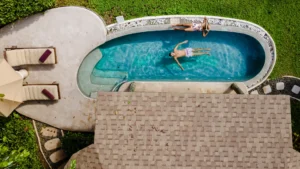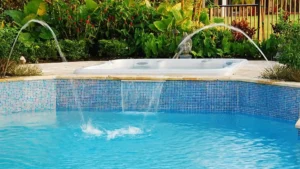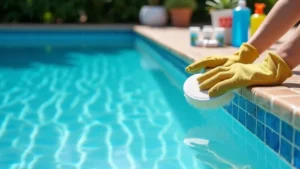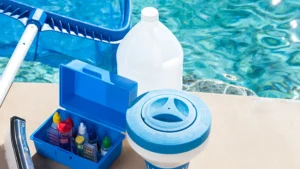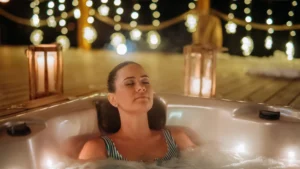
Choosing the right spa pool heater is more than just picking a piece of equipment. It’s about making sure every swim or soak is perfectly warm, no matter the season. The right heater turns your spa into a year-round retreat. And if something goes wrong, knowing your options for spa heater repair ensures you can quickly get back to enjoying your pool without interruption.
With so many options like electric, gas, solar, and heat pump heaters, it can be tricky to know which one fits your space, budget, and lifestyle. This guide will walk you through the different types of spa pool heaters, explain their benefits, and show you how to choose the right one so you can enjoy a perfectly spa all year long while keeping your investment protected with professional spa heater repair if needed.
Why a Spa Pool Heater Matters?
Keeping your water at a comfortable temperature, a spa pool heater makes every spa visit more enjoyable. Regardless of the weather outside, it’s essential for relaxation and can provide therapeutic benefits.
Cold water means you can’t enjoy your spa unless it’s warm enough, or you’ve got a heater to keep things cozy. Having a solid heater all year means you’re getting the most out of your cash.
Heaters are particularly important for:
- Enhancing comfort
- Extending spa season
- Increasing property value
It’s an investment that requires thoughtful consideration.
Types of Spa Pool Heaters Explained

Knowing the different types of spa pool heaters can help you make an informed choice. Each type of heater has varying features and advantages, all of which will suit different needs.
The main types of room pool heaters are:
- Electric Pool Heaters: Known for effectiveness and ease of use, these heaters are typically recommended for smaller spas.
- Gas Pool Heaters: These heaters are quick to heat and can be used on large pools, spas etc.
- Solar Pool Heaters: These are great for the environment and could also significantly lower energy costs.
- Heat Pumps: Very efficient and eco-friendly These work well in a moderate climate.
Choosing the right type of heater depends on many factors, including climate and pool size. In addition, the heater may or may not require regular maintenance, which will affect the ongoing costs.
It is beneficial to compare these different types, and determine which solution aligns best with your goals and budget.
Electric Spa Heaters
Since its installation is straightforward and performance is reliable, this type of electric spa heater is one of the best. Electric resistance heating works for smaller installations; therefore, it is more efficient at that size.
Benefits of electric heaters include:
- Quick installation
- Consistent heating
- Minimal space requirement
However, the operation costs can be higher due to electricity pricing. They work best for smaller spas where rapid heating isn’t as crucial.
Pro Tip: Always compare energy ratings to find a model that aligns with your budget.
Gas Spa Heaters
Heated quickly by natural gas or propane, gas spa heaters make an ideal choice for people looking for a swift answer to heating pool water.
The features of gas heaters are:
- Heat up pool water quickly
- Best suited for larger pools
- Can be utilized in any weather condition
Although they heat spa water quickly, they can be expensive to operate because of gas / propane prices. They do require regular maintenance to operate efficiently and for extended use.
Solar Spa Heaters
Solar spa heaters use the power of the sun to warm your pool or spa water, making them an eco-friendly option that can significantly reduce your energy bills. Using a green energy source for your spa saves cash and cuts down on emissions, so it’s more eco-friendly.
The benefits of solar heaters include:
- Low operating costs
- Renewable energy source
- Reduced environmental impact
Just a heads up, solar heaters depend on the sun, so they’re kinda hit or miss depending on the weather on days when it’s all cloudy or when winter’s here, you might need a backup heat source to keep your water nice and warm.
Before picking a solar heater, think about how much sun you get around here to make sure it works well all year long. According to the U.S. the Department of Energy solar pool heating is a super smart and cheap way to keep your pool warm without hurting the planet
Heat Pumps for Spa
Heat pumps operate by extracting heat from the air, transferring it to the spa water. They are energy-efficient, especially in moderate climates.
Features of heat pumps:
- Energy-efficient operation
- Suitable for steady, moderate heating
- Environmentally friendly
Though efficient, heat pumps can be slower than gas heaters. They also depend heavily on the ambient air temperature, affecting their performance in cooler weather.
Selecting heat pumps requires balancing upfront costs with long-term savings and environmental considerations.

5 Spa Heater Tips
1. Spa Size
When it comes to your heater, size really does matter! You need one that can handle the volume of your spa to keep the water at your ideal temperature. If your heater is undersized, you’ll find yourself waiting longer for warmth, racking up energy bills, and possibly facing the hassle of maintenance or repairs.
So, make sure your heater is a good match for your spa or pool to save yourself some headaches and extra expenses.
2. Energy Efficiency
Investing in a more energy-efficient heater might seem pricey at first, but it pays off in the long run. Take a look at the energy ratings to find a model that keeps your pool or spa cozy without breaking the bank on your utility bills.
If you’re unsure, don’t hesitate to reach out to us. We’re a professional pool and spa service provider and can help you find the right balance between initial costs and future savings.
3. Local Climate Considerations
Different regions have different heating needs:
Phoenix: The desert can get chilly at night, so gas or heat pump heaters are great for keeping your water warm when temperatures drop unexpectedly.
Florida: With all that humidity and sunshine, solar heaters are super efficient, but it’s wise to have electric or gas backups for those cloudy winter days.
Dallas: Hot summers and cold winters call for a heat pump with a gas backup to ensure you have reliable heating all year round.

4. Health and Wellness Benefits
Warm water is more than just a luxury; it’s a boon for your health! It helps with circulation, eases muscle tension, and reduces stress.
The Clevand Clinic even highlights that hydrotherapy and warm water therapy can aid in injury recovery, alleviate chronic pain, and enhance overall mental wellness. So, having a well-heated spa is truly an investment in your well-being.
5. Installation, Maintenance, and Service
Don’t forget to factor in installation costs, ongoing maintenance, and the availability of service providers. Opting for a heater that’s easy to maintain and repair can save you time and money in the long run.
Regular check-ups can help catch small issues before they turn into expensive repairs.
Pro Tip: Choose a spa heater that fits your spa size, climate, and lifestyle, while also considering professional service support.
FAQ’s
1. Why is a spa pool heater necessary?
A spa pool heater allows you to have consistent, comfortable water temperatures that mean you will be able to use your spa all year round. A good heater will help you make the most of your spa by increasing your comfort and extending your spa season, and in the case of gas heater, it may even add value to your property.
2. What types of spa pool heaters are available?
There are 4 main types of spa heaters:
- Electric heaters – they are generally efficient, easy to install and good for smaller spas.
- Gas heaters – they heat spa pools quickly and are mainly used for larger pools.
- Solar heaters – Eco friendly, lower running costs and heats using the suns energy.
- Heat pumps – very energy efficient but often most suited to moderate climatic conditions.
3. How do I choose a heater for my spa?
Many factors must be considered including pool size, climate in area, energy efficient heater options, installation costs and maintenance. It is essential to match a heater choice to a projected usage and budget. This will then help to ensure satisfaction and longevity.
4. Do you provide spa pool heater installations for amenity or community pools?
Yes! We provide professional spa pool heater installation and maintenance servicing amenity pools in apartments, hotels, and community centers. We will provide the luxury of a perfectly heated pool throughout the year, providing warmth for guests or residents while examining.

